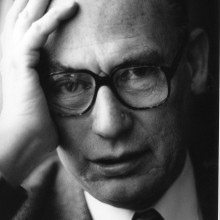Polish literature

Michał Głowiński
Born 1934, Głowiński is a literary historian, literary critic, essayist, non-fiction writer and one of Poland’s most highly regarded experts on literature. He has written many academic works that have inspired whole generations of students of Polish literature.
Głowiński’s research interests are very wide-ranging, including the history and theory of narrative form (The Young Poland Novel), the language of poetry (The World Beyond, Imagined: Sketches on the Poetry of Bolesław Leśmian) and literary communication (Styles of Reception). An important part of his work is devoted to analysing the language used by Polish communist propaganda (e.g. Newspeak in Polish). Since the late 1990s he has concentrated mainly on memoirs that belong to the literary history of the Polish Jews (e.g. Black Seasons, A Brown-Bread Madeleine and The Story of a Single Poplar).
Głowiński’s prose provides striking evidence of the era in which history was “unleashed”. While his works, including A Bridge Over Time and Little Town Images, are plainly autobiographical, they also resonate with an archetypal fate common to an entire generation. He begins with an account of the “black seasons”, or in other words, the occupation years, which he miraculously survived as a child thanks to the help of many people, including nuns. His next few books cover his adolescence in the shadow of another form of totalitarianism, the Stalinist variety.
However, it would be wrong to say that history and politics are the only forces driving his prose. Głowiński is mainly concerned with personal experiences, including some quite intimate ones; he recalls his childhood and youth, portraying the people and places that were close to him and commenting on a family saga that never had a chance to materialise. Why? Because, as he notes in The Story of a Single Poplar, “It is not possible to write a family saga that would tell the story of the disappearance of a particular world, about its physical end”. Yet in his account, he does try to save the Little Town, the place at the centre of his private universe, while exploring some ideas on how memory works and ways of representing it in literature as he does so.
BIBLIOGRAPHY (MEMOIRS ONLY)
- Czarne sezony, Warszawa: OPEN, 1998.
- Magdalenka z razowego chleba, Kraków: Wydawnictwo literackie, 2001.
- Historia jednej topoli, Kraków: Wydawnictwo Literackie, 2003.
- Skrzydła i pięta, Kraków: Wydawnictwo Literackie, 2004.
- Kładka nad czasem. Obrazki z Miasteczka, Kraków: Wydawnictwo Literackie, 2006.
- Monolog wewnętrzny Telimeny i inne szkice, Kraków: Wydawnictwo Literackie, 2007.
- Fabuły przerwane. Małe szkice 1998-2007, Kraków: Wydawnictwo Literackie, 2008.
- Kręgi obcości. Opowieść autobiograficzna, Kraków: WL, 2010.
- Carska filiżanka, Warszawa: Wielka Litera, 2016.
TRANSLATIONS
czech:
- Černé sezony [Czarne sezony], Olomouc: Nakl. Olomouc, 2002.
english:
- The black seasons [Czarne sezony], Evanston: Northwestern Univ. Press, 2005.
german:
- Eine Madeleine aus Schwarzbrot [Magdalenka z razowego chleba], Frankfurt am Main: Jüdischer Verl. im Suhrkamp-Verl., 2003.
swedish:
- En svart tid [Czarne sezony], Stockholm: J och Z Publ., 2001.